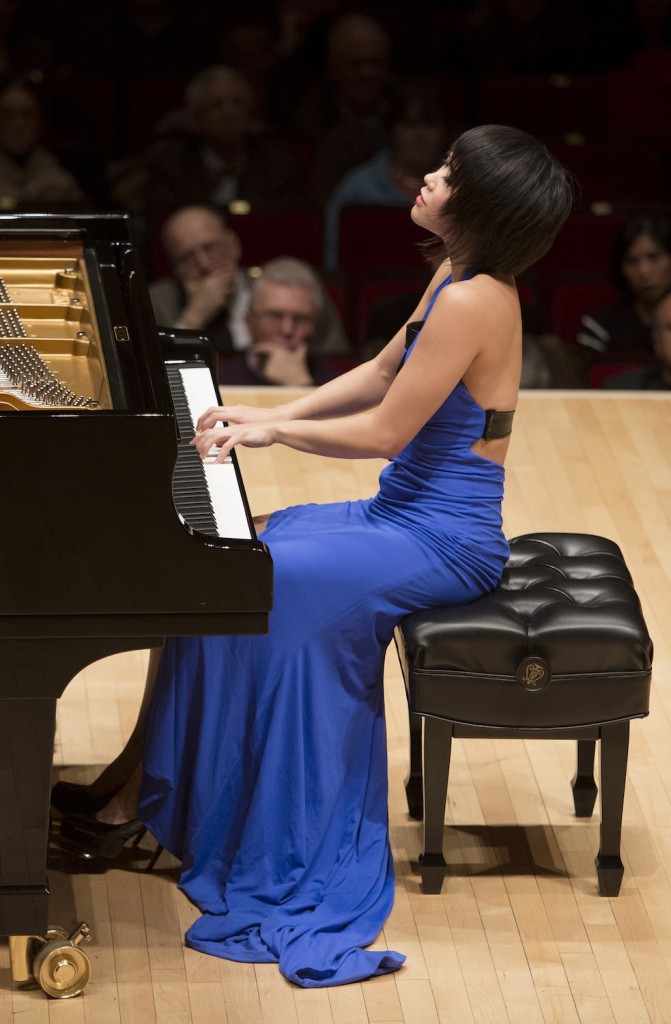Yuja Wang delivers stunning artistry and blazing bravura in memorable Carnegie recital

Yuja Wang performed music of Schubert, Scriabin and Balakirev Thursday night at Carnegie Hall. Photo: Jennifer Taylor
Just as there are five-alarm fires, there are five-encore recitals, and New York got one on Thursday night.
If Yuja Wang hadn’t already “arrived” as a major pianist, then it’s safe to say that her recital at Carnegie Hall was a moment that made her arrival manifest. Anyone who still discounts her as a serious artist because of her congenial sartorial tendencies would have been stunned into silence—or, more likely, frenzied applause—by this mature performance.
An element of unexplained delayed gratification didn’t hurt—the house lights didn’t come down until about ten minutes after the scheduled time, and Wang herself didn’t materialize for another five minutes after that. The playing that followed was worth waiting for.
The first half was all Schubert (more or less), beginning with three of Liszt’s lieder transcriptions. The first two were from Schwanengesang; there was beautiful, impressionistic blurring in the left hand in “Liebesbotschaft” and colorful, spirited passion in “Aufenthalt.” “Der Müller und der Bach,” the penultimate song from Die Schöne Müllerin, had a warm glow. In all three, she played with enormous sensitivity, as though she were accompanying a singer.
Not everyone would have agreed with her take on Schubert’s A-Major Sonata, D959. At times in the early part of the Allegro she was stormy and slightly over-aggressive in her touch, almost straying into Beethoven territory. Yet Wang convinced even through the bluster, with the music’s indispensable charm always evident.
In the Andantino she had a perfect grasp of that quintessentially Schubertian mix of pining sadness and soft-eyed nostalgia. The main subject seemed to float out of the piano. More hazy introspection characterized the trio of the third movement, while the scherzo was lively, even if fractionally too heavy. The closing rondo was played with smiling grace.
Wang’s Scriabin selections were, remarkably, even better than her Schubert. If you weren’t watching, you’d have had no clue that the first Prelude, Op. 9, No. 1, was for the left hand alone. Her voicing was impeccable, her musicality gorgeous. Nothing in this recital ever felt cramped, and the Prelude in F-sharp Minor (Op. 11, No. 8), glittering and spacious, was no exception.
She changed tack with the Two Poems, Op. 63, pungent tones and creeping textures serving to counter the honeyed sonority of everything that had come before. The “Black Mass” Sonata was a dizzying spiral into delirium, its insistent, distracted madness terrifying to hear.
Wang finished the printed program with a gymnastic, crackling performance of Mily Balakirev’s Islamey. This piece is a whirlwind crowd-pleaser, and Wang’s performance was flashy, but not showy—even at its breathless tempo it seemed to breathe, as she showed off an endless range of expression.
The sheer variety Wang showed off in this recital was astounding, drawing on a prismatic array of colors to bring rich understanding to every work she touched. What’s more, her pacing was just about miraculous—not a single moment in the nearly two-and-a-half hours seemed rushed or drawn out; everything was “just right,” unfolding in its own logical time.
As for those five encores, this wasn’t one of those self-congratulatory parades that often follow recitals. Wang’s extras were worth the half hour they added, all tastefully chosen and brilliantly performed.
The Tausig transcription of Schumann’s “Der Kontrabandiste” had an icy shimmer, while humor and fireworks characterized Horowitz’s Carmen Variations. Chopin’s Waltz in C-sharp minor could easily have made for a graceful end to the evening, but she opted instead to send everyone out grinning with a sparkling rendition of Art Tatum’s jazzy retooling of Vincent Youmans’ Tea for Two.
Best of all was the second, Liszt’s transcription of Schubert’s seminal lied, Gretchen am Spinnrade, which even outshone the programmed transcriptions on the first half. While other performers get cute with their rubato and skew the delicate arabesque accompaniment, there was no such fussing here. Wang treated this transcription like a serious piece of music, and it was spellbinding, heartbreaking, breathtaking as a result. The ethereal murmur of her left hand was matched by the pleading, ghostly phrasing of the melody in her right. If you had run onstage to see whether Christa Ludwig was hiding in the piano, no one would have blamed you.
Posted Dec 16, 2014 at 11:45 am by Patricia Freeman
This review beautifully allows one to re-experience what was already perceived–AWESOME!!